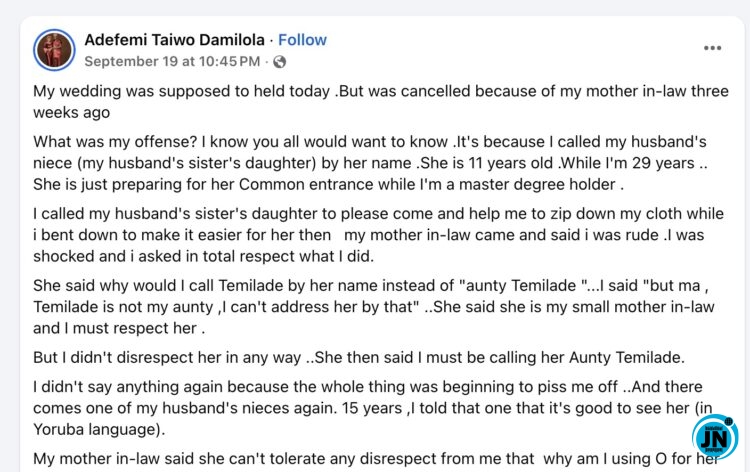A Nigerian lady has shared an emotional and heartbreaking account of how her much-anticipated wedding was abruptly cancelled just three weeks to the big day, following a shocking disagreement with her prospective mother-in-law. The cancellation, which has since gone viral on social media, has sparked heated conversations about cultural expectations, respect, and generational clashes within Nigerian families.
According to a narration posted by relationship adviser, Adefemi Taiwo Damilola, the entire issue began from what the lady described as an “unreasonable” demand regarding the way she was expected to address her fiancé’s younger relatives. The demand, though seemingly small to outsiders, grew into a major clash that ultimately cost her the marriage she had been preparing for.
The incident that triggered the fallout
In her own words, the lady recounted: “My wedding was supposed to hold today. But it was cancelled three weeks ago because of my mother-in-law. What was my offence? You may not believe it, but it is because I called my husband’s niece, Temilade, by her first name instead of addressing her as ‘Aunty Temilade.’ Temilade is only 11 years old, preparing for her common entrance exams, while I am 29 years old and already a master’s degree holder.”
She explained that she had simply asked the girl to help her zip down her dress in a respectful manner when her mother-in-law suddenly accused her of being rude for not using the title “aunty.” Despite her attempt to respectfully clarify that Temilade was not her aunty, her prospective mother-in-law insisted that she must address the girl, and every other younger relative in the family, as “aunty” or “uncle.”
The clash escalates
The situation escalated further when she greeted another niece, this time a 15-year-old, using what her mother-in-law considered the wrong Yoruba pronoun. The young bride-to-be said she explained that she had younger siblings at home, including a 21-year-old brother, yet was now being asked to call children younger than him “aunty” and “uncle.” According to her, she considered this demand humiliating and unnecessary.
Her mother-in-law reportedly stood her ground, insisting that if she could not comply with the family tradition of showing respect by addressing even younger relatives with honorary titles, then the marriage would no longer take place. The young woman stood her ground as well, refusing to give in. At that point, her fiancé was called into the matter. Instead of supporting her, she claimed he asked her to comply with his mother’s wishes, describing her refusal as “pride.”
Wedding cancelled
Unable to resolve the disagreement, her mother-in-law reportedly phoned the head of the family and officially announced that the wedding was cancelled. “My husband-to-be was right there, and instead of defending me, he blocked me on all social media platforms afterwards. That was when I realised the marriage was truly over,” she revealed.
The lady added that she was grateful she had not yet packed all her belongings into her fiancé’s home, and immediately called her sister to halt preparations at her own apartment. “Thank God I haven’t moved completely. I would have been stranded,” she said. Despite the heartbreak, she maintained that she could not compromise on an issue she described as demeaning to her self-worth.
Her reflections on the experience
Reflecting on the incident, she wrote: “This is 2025. I am a peaceful and respectful person, but I cannot be forced to call children I am 15, 18, or even 20 years older than ‘aunty.’ That is not pride—it is self-respect. I have achieved a master’s degree, built a successful business, and developed valuable skills through hustle and hard work. To now be reduced to calling an 11-year-old ‘aunty’ simply because of tradition is something I cannot accept.”
She went further to suggest that if she had been born into a wealthy family like the Otedolas or Adelekes, she would not have been subjected to such treatment. “Imagine if I was Otedola’s daughter. Would anyone demand that I call a child still preparing for common entrance exam my aunty? Absolutely not,” she said.
Her decision moving forward
Concluding her narration, the lady expressed gratitude that she had discovered the family’s stance before walking down the aisle. Though the rejection was painful, she maintained that she would rather remain single than live in constant humiliation. “I am single, guys. Pray for me and wish me well. I will heal, move on, and keep working hard to achieve greater things in life.”

- undefined